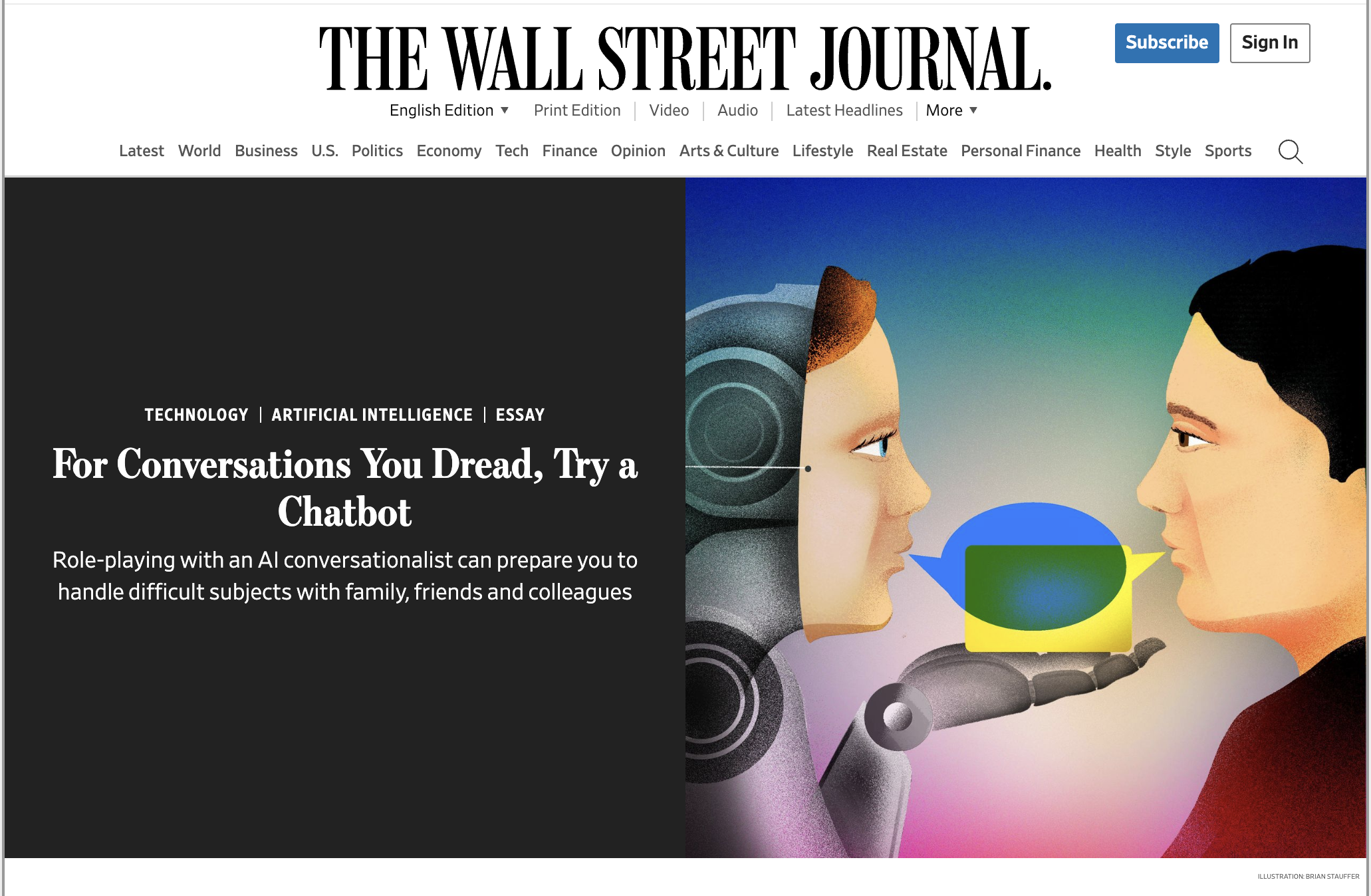Episode 10: Phoebe Yao
Phoebe Yao is the Founder and CEO of Pareto, a software company that automates mundane tasks for business founders. With a company that operates in eight different time zones, Phoebe joins us today to explain the importance of creating space for serendipity and chance encounters in the world of remote work and how she goes about this. We discuss the tension between breaking down barriers between work and personal relationships while also advocating for self-care and personal time. Find out how Phoebe overcame her hesitancy to talk about work in social interactions, how she overcame the fear of being vulnerable in front of her team, and how she supports her own self-care.
Fostering Serendipity and Chance Encounters with Phoebe Yao
Episode 10: Show Notes [TRANSCRIPT below]
If there’s one thing that today’s guest, Phoebe Yao, learned from the pandemic it's that innovation comes from lucky chance encounters. Phoebe is the founder and CEO of Pareto, a software company that automates mundane tasks for business founders. With a company that operates in eight different time zones, Phoebe joins us today to explain the importance of creating space for serendipity and chance encounters in the world of remote work and how she goes about this. We discuss the tension between breaking down barriers between work and personal relationships while also advocating for self-care and personal time. Tuning in, you’ll hear how Phoebe overcame her hesitancy to talk about work in social interactions, how she overcame the fear of being vulnerable in front of her team, and how she supports her own self-care. To find out how to show up as a manager and leader as your full self at work, how to foster a culture of openness across cultural divides, and how to kindle serendipity on a remote team, tune in today!
Key Points From This Episode:
• An introduction to Phoebe Yao and her company, Pareto.
• Phoebe’s revelation that innovation comes from lucky chance encounters.
• How Phoebe overcame her hesitancy to talk about work in social interactions.
• Thoughts on the Esther Perel quote: “The quality of your relationships is the quality of your life,” that helped Phoebe level up in business.
• How Phoebe overcame the fear of being vulnerable in front of her team.
• An example of a situation where Phoebe failed to show up as her full self.
• How the company’s key values and principles foster a culture of openness.
• The boundaries Phoebe sets for herself in light of the fact that her business operates in eight different time zones.
• Meditation, journaling, and other things Phoebe does to protect herself from burnout.
• How Phoebe kindles serendipity on a remote team.
• The way Phoebe leads meetings and makes sure everyone gets what they need.
• How Phoebe decides between protecting her boundaries and sacrificing her time to help her team.
• Why Phoebe recommends seeing a therapist to anyone who wants to advance more quickly in their career, as well as the book The Great CEO Within.
Tweetables:
“‘The quality of your relationships is the quality of your life’. And I was never like ‘Oh yeah, that applies to work,’ but it applies to everything.” — @phoebexyao [0:08:44]
“I think the narrative that relationships have to be professional or personal is a completely false story that we tell ourselves and it completely limits your creativity because you don’t feel like you can just show up as your full self.” — @phoebexyao [0:10:46]
“Oftentimes, people just are not aware of what the problem is. I found that the key to being a good project manager or unblocker on these daily scrums, and whatever meeting that I’m leading, is being able to help that team member identify what their problem actually is.” — @phoebexyao [0:29:34]
“I think that there’s also a level of respect that I have to have for my team members and their time. If 30 minutes of my time can unblock hours of theirs, that’s going to be so much more higher leverage for me and for them than me having 30 minutes back in my day.” — @phoebexyao [0:32:05]
Links Mentioned in Today’s Episode:
[TRANSCRIPT]
[00:00:00] PY: One day, we go out and we’re like walking around this park and he’s telling me about how like years ago he would go to this park and he’d think about these philosophical deep questions about life and how he’d sit in this bench. I was just like realizing, “Oh my gosh! This person is a human.” I’ve been treating them as my VP of Eng, but really, he’s a human just like me.
[00:00:25] JU: Today, we talk with Phoebe Yao, founder and CEO of Pareto which automates mundane tasks for founders. In this invigorating conversation, Phoebe talks with us about the need to create space for serendipity. She talks to us about learning how to be a manager by listening to her people and how to show up as a manager and leader as your full self at work. She also talks about the tension between breaking down barriers between work and personal relationships, while at the same time advocating for self-care and personal time. Managing a team across eight time zones and cultures has taught Phoebe incredible lessons about what it means to be a leader today.
The thing that noticed is, for myself, I’ll just speak for myself as an instructor and as a public speaker. I can only tell the stories that I know. That’s it. I mean, it’s like, “Well, duh.” But then the question is, okay, if I want there to be a more diverse mix in my storytelling portfolios, so to speak, what do I have to do? I found that it’s incumbent upon me to learn a broader range of stories. Nobody’s handing them to me, so that’s something that I’ve taken seriously as a personal learning journey for myself.
With that, I thought, it’d be kind of cool just to hear – you had mentioned earlier, innovation comes from lucky chance encounters. I love to hear how did you learn that? What was the experience that helps you realize that? Would you just walk us through the actual moment?
[00:01:56] PY: Honestly, COVID, an entire year of COVID was the – you realize what you had when you don’t have it anymore. I have been so privileged all my life to be in amazing communities from Stanford to being part of [inaudible 00:02:16] to being part of On Deck, and The Thiel Fellowship, and all these people surrounding me, and supporting me and giving all this energy. Also, this like random conversations that would lead to deep insight about what I was working on. I don’t think I really realize how essential that was to my learning and growth process until I didn’t have that anymore. I was pretty much just working out of my room after I dropped out in 2020. I was like working out of basements because I was scared of COVID. I would like go to my friend’s basements and live with them, and like their homes. I didn’t want to go back home and I didn’t have money to buy my own apartment. I was just like couch surfing.
I was just like alone working, and it was so depressing and it was so deenergizing. I push through, but I became so, so focused and single-pointed in how I worked that I didn’t really have the opportunity for chance encounters to help me like debug my own cyclical thought patterns and figure out my blind spots. Yeah, I think it’s like – what happened was, I started being part of more group houses with founder communities. I was living in a group house in Cancun with six founders. I was traveling to Maui and there was this founder community there. I’ve gotten really shy about talking about my business because I just like hadn’t really had the opportunities to share what I was doing over the pandemic.
When I came in person with these people, at first, I was like really just – I didn’t want to talk about work. I like was really close about like my personal and professional relationships and where they could go. For a while, it was just like thinking that I had like just focus on work and on the Internet. Then when I realized, like talking to people and then –
[00:04:33] JU: Compartmentalizing, right?
[00:04:34] PY: Exactly.
[00:04:35] JU: You’re going to say, work is over here and my personal life – I’m really inspired by that sense of mixing. We’re talking about with another founder a few weeks ago, Amy Yin. He said, every dinner part, she makes it a point to ask everyone to share what’s a challenge you’re facing at work. I thought, “Wow! What a great example of forcibly mixing.” Because it’s so easy to think, “Oh! I don’t want to ruin the vibe. I don’t want to talk about work.” But actually, she’s like, “The most amazing insights and connections come when we give people the permission.” How did you overcome that hesitancy to talk about your work? How did you come back out of the basement, so to speak in terms of social interactions?
[00:05:16] PY: Oh man! How did I come out of the basement? Such a good question.
[00:05:21] JU: Was there a moment or a chance in case? You mentioned earlier innovation comes from these chance encounters. Was there a chance encounter perhaps that made you go “Oh! I’ve been missing this”?
[00:05:33] PY: You know, there’s one that really comes to mind. I was hosting a get together for my communities at Dolores Park a few months ago. I was just talking to everyone, like I was trying to have a good time. At that point, I was like also just not really secure about talking about work with friends. I just felt like, “No. I want to be like talking about life. There’s so much more to life.” Then, I overhear someone who mentioned that he was working at scale. I was like, “Oh my gosh! Scale has such a similar model. There’s like so many interesting synergies here in terms of the ideas that we’re exploring.
I just ventured to be like, “Hey! This is what – I’ve been thinking about these systems I’ve been trying to build.” Then we just started jamming and it was like this literally pivotal conversation that changed the way I was thinking about the value prop that Pareto was delivering. Actually, it motivated us to move at a completely different direction. Now we have something like really exciting conviction about a new pivot that we’re exploring. It was actually huge. If I hadn’t taken that chance to talk to him outside of a like explicit setting, it would have – like I wouldn’t have had the opportunity.
[00:06:55] JU: That’s awesome.
[00:06:55] PY: I think that kind of ties into this general theme that I’ve been navigating in the first few years of being out of school, in a full-time job, a founder, and like a manager and a leader, like all of these things for the first time is understanding that there is literally no black or white ever in anything. Like school teaches you that you’re supposed to just like get 100 percent or you’re like just zero. You fail or you’re perfect. It thought me to be such a perfectionist. I always thought there was just one right way to do things, but there’s never just one right way. It’s always a gray area that you have you navigate, and the incredible thing is that, because I’m building something new, there’s never going to be an answer and I’m always just having to navigate this gray area to discover what’s undiscovered. I just found there’s so much synergy in terms of my personal growth and what I was building. That was really cool.
[00:07:57] MH: That’s cool.
[00:07:59] JU: Basically, you’re saying, eavesdropping a conversation in the middle of Dolores Park and boldly asking the socially – maybe politically incorrect question led you to a conviction to pivot the business where you haven’t been pivoting for the months that preceded.
[00:08:19] PY: Oh, yeah. I mean, I was going in circles. I was not able to answer my own questions. I was just having a really hard time finding people to talk to and having meaningful conversations come out of that. The really crazy thing is that – actually, I just recently discovered Esther Perel, who is this incredible relationship therapist and she had this one-liner that’s like, “The quality of your relationships is the quality of your life.” I never was like, “Oh yeah, that applies to work,” but it applies to everything and it applies to the people you work with. At the end of the day, it’s not even about where you go, it’s not even about the journey. It’s about who you bring on that journey with you. That I was also, I feel like I Ieveled up when I realized that.
[00:09:07] JU: That’s beautiful. Thank you for sharing that.
[00:09:10] PY: Thank you.
[00:09:11] MH: I think one of the things you said that’s true, like I think it’s very lonely as a founder up in the top. I think if you don’t have that group of friends around you or similar people, it’s just extremely hard. It’s interesting that you found those people in those communities. But actually, I ask my founders to be intentional about it, like, how do you create your founders’ anonymous group that you can go to? It definitely works, so it’s very impressive that you figure it out early.
[00:09:45] PY: It’s been a lot of trial and error, but yeah, I think I’ve had great models in my life to just kind of learn from. I definitely feel like Silicon Valley comes in cohorts. Every group of people that come in are in different stages, they really build each other up and help each other. I’ve seen that happen or friends who are much later stage than I and think I try to replicate what I like in my friends.
[00:10:15] JU: Phoebe, how is this realization impacted your behavior moving forward. I love to know. You had this epiphany eavesdropping in the park. Has it affected how often you go to the park or how often you interrupt people or how you show up at dinner parties? Like what does it look like in terms of – one of the things we’re always curious about is creative practice in behaviors that increase your likelihood of serendipity. What if you incorporated more as kind of a mindset, or a behavioral shift as a result of this realization?
[00:10:45] PY: It’s really huge. I think that as soon as you – like the narrative that relationship have to be professional or personal is a completely false story that we tell ourselves and it completely limits your creativity because you don’t feel like you can just show up as your full self. You have to be this one person or you have to be another person. So then we like constrain ourselves and the conversations that we have and what we’re comfortable talking about to whom. This actually has been the root of the problem, problems that I’ve been having understanding how to navigate stakeholder relationships at my company at Pareto. I always felt so weird showing up as the youngest person in the room with my team, and being their leader and not really knowing how to show up as a full person. Like I thought I had to be like some kind of cold-distant-meter type or I had to put up some image.
When in reality, if I reconnected with just like who I am, whatever that means to yourself, your heart, your spirit, whatever and you just bring that to the table with your team, it makes the space – it feels so much more safe and it makes everyone feel more at home and at ease and connected.
[00:12:13] MH: Are you ever scared of being too vulnerable in front of your team because sometimes, I think teams are looking at you as the rock to follow.
[00:12:23] PY: Oh my gosh! All the time and I struggle with that because it’s not just – again, it’s not black and white and it’s not just being super vulnerable because there’s a time and place to be vulnerable with your team. I think that it’s about not ignoring feeling and it’s about being the first to acknowledge how people might be feeling and how you might be feeling. And like just creating a container to be like, “That’s okay” and it’s okay that we’re going through all these ups and downs and that we shouldn’t just push our emotions aside, or what’s happening at home aside. It’s all part of the remote work experience, especially. Then that just makes people feel heard, and seen and accepted. It makes them feel like they can show up in any way that they want to in the workplace.
[00:13:19] JU: I’d love for you to bring us into the room, Phoebe in one of these recent times where you felt you showed up as your full self. What I would love to hear about is, what was at stake, because it sounds like that’s a conscious decision you’ve got to make. I’d love to hear, “Okay. This moment” and help walk us through what is it. What does it mean to show up as your full self, what were the trade-offs may be involved in that and what was the impact of deciding to go there?
[00:13:48] PY: Ooh! Yeah. Wow! I have to take a minute to think about which moment, because there is a lot.
[00:13:56] JU: Yeah. Take time. No problem. Or if there’s a moment where you felt like you failed to be yourself as well, or you decided to be guarded, withhold yourself.
[00:14:06] PY: Okay. Well, that’s easy. There are lots of moments where – well, most recently I think just trying to figure out. There’s like so many layers to the story.
[00:14:18] JU: Unpack it like an onion, like start in the –
[00:14:21] PY: Okay. Here’s one. I have it. A few months ago, we hosted this team retreat and we had everyone in Europe and North America who was vaccinated come to Barcelona for a week of in-person work and fun. It was like the first time anyone on our team had really met each other in person. It was really strange. When you take virtual world and put it into one big house, everyone is working together and it’s just like extreme – it’s just extreme and it feels so intimate, it feels so much more close than you would be used to in a room at work setting. Yeah, that was an experience.
I came in really scared and hesitant of like how to show up. I like didn’t really – like one particular example, I was just hanging out with my VP of Eng, his name is Adrián. There were moments when I didn’t really understand what he was trying to say. He’s French. Like French engineers have archetype that I’ve like lately figure out from like talking to other founders where in France, the culture is very argumentative, much more so than in the U.S. When they speak, they can come off really like high friction, like really disagreeable.
[00:15:55] JU: It’s painful. You’re being so polite. It’s painful.
[00:16:00] PY: It’s kind of painful.
[00:16:00] JU: I mean, I’ve had people in that culture be like, “That’s a bad idea.” You’re like, “Woah!”
[00:16:06] PY: Yes. Oh my God! Whoa! Tell me what you like first.
[00:16:09] JU: I had no idea that that was the case. For the longest time, over the phone when we would call or over Zoom, I would just be like dying inside when he would like say, “No, that’s wrong.” I’d be like, I feel kind of shut down. I felt really intimidated by him and didn’t feel comfortable saying things. It was really bad for the first few days when we’re living together, when we’re trying to brainstorm and I constantly felt shutdown, I constantly felt like, “This is so weird because I’m supposed to be the one in charge kind of, but like I don’t feel like it.” So then I kept on pushing back and be like, “No, you’re wrong” or like – and it just kept on spiraling. It was just so completely ineffective in terms of the brainstorms we try to do.
One day, we go out and we’re like walking around this park and he’s telling me about how like years ago he would go to this park and he’d think about these philosophical deep questions about life and how he’d sit in this bench. I was just like realizing, “Oh my gosh! This person is a human.” I’ve been treating him as my VP of Eng, but really, he’s a human just like me and there’s so many human things that we could connect on, rather than just debating about product specs.”
I was like, “Hey! Adrián, I wanted to talk to you about how when you say these things, when you like speak to me in this way, it like actually makes me feel really intimidated and it makes me a bit stressed out to talk back to you.” He was like, “But that’s just the way I talk, that like how I show respect, is just by being blunt and being like, this is what I see.” It turned out that like, there was this huge miscommunication between like what he meant and what I have interpreted him meaning. Like I thought that he was thinking my ideas were dumb, when in reality, he was showing me that he respects my ideas and that like he wants to – like he respects my intelligence and that he wants to make things better.” Yeah, that just ended up being like kind of incredible moment where I realized that, if I am just more open and I realized that he doesn’t come with bad intentions, but that he also comes with like his cultural background and his way of speaking, that I can connect back to him and make a more meaningful conversation out of it.
[00:18:52] MH: I got a question. It’s such an interesting story about how you opened up to him and kind of that was understanding. How do you take that to the rest of your company, right? I think [inaudible 00:19:02] culture, how do you make sure that people around Adrián actually are opening up?
[00:19:10] PY: Yes. That’s a good question. It is really hard to – our team is completely remote. We’re distributed over eight different time zones, from eight different cultural backgrounds. There’s like somewhat of a shared language, and a shared set of principles and values that you have to build up for your team and you have to constantly remind each other that like, this is why we’re here. We have like several key values and principles that we remind each other of, from like anything like assuming positive intent or good intent, despite what you think those words sound like, asking, and clarifying and making sure that your interpretation is exactly what they meant to say. Because English words can be misheard and misinterpreted in so many different ways. That’s just one example.
We do this across both our core team and our operations team. We have a large workforce of woman based in the Philippines that work with us on the data labelling work that we serve our customers. Between our core team and our operations, there are so many different cultural differences. For instance, like how do people like to connect at work in the Philippines. Like there’s a lot more small talk, there’s a lot more like talk about family and talk about kids. That like in our core team, it just doesn’t happen. But that all creates these really, really strong bonds between the women on our team and helps them feel safe enough and secure enough to bring up their challenges and work with each other to solve the problems.
There’s just like all these intricacies around like preferences of people from different backgrounds that I’ve had to navigate and I had to build up my empathy and compassion for. Then for us to build systems to support that.
[00:21:05] MH: You have like double challenge. It’s always hard to build a culture and now you do it across eight time zones and different nationalities. It’s a huge experiment that we’re all running now, how we build just strong culture.
[00:21:19] JU: I think it leads really well into something else you are mentioning earlier, Phoebe, which is self-care, mental health. Working across eight time zones, it’s theoretically possible, you’re working all the time, right? There are no boundaries when you’ve got eight time zones worth of people. How do you think about setting boundaries for yourself on a boundaryless team?
[00:21:43] PY: Oh man! That’s really hard. It’s a really hard question. One thing I’ve been thinking about is how, especially in Silicon Valley, we just over instrumentalize our time and our our lives. We make everything that we do have to have some kind of purpose or some kind of function. It makes sense because we’re trying to build businesses and make money. It’s like very much like a capitalistic culture. But the problem with that is that you end up having all these anxiety about like, every time you want to time for yourself, like what is the point of taking time for myself. I end up getting into these traps where I guilt myself into working more because I’m like, “Oh! Every hour that I’m spending on my company is just higher leverage than every hour I could be spending reading a book.” It was just this really toxic framing that I had and I have no boundaries. Then it became unsustainable because I just burned out.
The new framing that I came up with was actually that, first off, you don’t have to have a reason for doing something, like you don’t need to do something for the purpose of like collecting revenue. It could just be something you do for fun for yourself, to enjoy the small things in life. You need those moments to enjoy the process, because the process is getting really philosophical, but just like realizing that as a founder, the process is really all there is. There’s like, it’s the roller coaster that I’ve signed up for and it’s not just about reaching the milestones, that’s about like how much I learn and grow and enjoy getting there. So if I don’t enjoy it, then I can’t possibly do this for like seven more years.
With that argument in mind, I was like, “Okay. I need to start setting more space for myself to not have to be anything, to like just exists and not have to like be functional or to do something about my time.”
[00:23:49] JU: How do you operationalize that? Are there blocks on your calendar? Do you have a day that you don’t show up? I mean, again, of course, Silicon Valley mindset. I’m getting to instrumentalization as you’re saying. But like, my tendency is to say, or I think the default is, keep working. I’m less like intervened on by an outside force, which usually takes the form of one of my children, or my wife or something. I’m going to keep working, right? Usually, if somebody opens the door and it’s like, “It’s time for dinner” and it’s like, “Oh, yes! Sorry.” What are those forces or mechanisms for you that protect you from the tendency towards burnout?
[00:24:25] PY: Right. I mean, I could say calendar. I could say there’s like a bunch of blocks on my schedule where I don’t like take meetings and I sleep. But it’s not really about the tools at the end of the day, because if I don’t want to sleep. I’m not going to sleep. If I guilt myself out of sleeping, I’m just not going to sleep, which happens often. It actually comes down to – some practical things I do are, I meditate a lot. I like just take time to just not do something. I tried to meditate and journal and like reconnect to what I have feeling. Because when I’m in [inaudible 00:25:07], I’m usually just thinking, but I’m not really taking the time to heal. That’s just horrible. It’s so bad to not have that balance.
When I take a step back and I can feel that I’m tired or I can feel that I’m like really just like not enjoying something, it means that I can like see that this is something that’s not going to be sustainable. I can step away before I burn myself out, and know that like by stepping away, I’m actually going to give myself more power in the future to have that energy to do the things I need to do. Yeah, that’s kind of the only mechanism I found that really works for me. Because if I try to do something structured, I’m just going to rebel because I don’t like rules, I don’t really like following things for the sake of following things.
[00:25:55] JU: I think it’s good. I think that there’s this – what you’re talking about is being connected to yourself and being aware and giving yourself permission to be connected and have to disconnect when it’s necessary. Sorry Mar, you’re about to say?
[00:26:09] MH: No. I was saying, having – I mean, we’ve all been working remotely and I sort of feel that it’s forced. There’s less serendipity at work because it’s all more planned and structured, and kind of almost went back to the first point. Like I don’t know how much structure time meetings you guys have at the company, but how do you kindle the serendipity, with everybody being far apart?
[00:26:34] PY: Oh man! I think that for one, I used to hate meetings. I used to think that they were such a waste of time. But actually, after we stopped doing meetings, things just obviously slowed down, people were just not getting work done because they were getting stuck, and they were getting stuck in their heads and they were just – yeah, they were just getting unproductive. There’s this barrier to reaching out over Slack and asking people for time because you never want to just like intrude on someone’s deep work time, but that ends up being such a huge barrier to connection and serendipity on the team. I’ve ended up just being like, “Hey! I hear that.”
Actually, what we ended up doing is we now have like daily – it’s kind of hardcore, but we have daily standups and then problem-solving sessions for about an hour, and hour and a half every morning, except for Wednesday. Wednesdays are our sacred no meeting days, but every other day, we have these standups where everyone on the team – because we are still like under 10 people, everyone gives an update on their project and blockers that they have. Then, everyone who is listening is responsible for responding, and giving ideas. Then if the conversation goes on, they move to the problem-solving breakout room and they talk about how they can solve each other’s problems.
Oftentimes, we basically unblock everyone before the beginning of the day to end up doing their work. Oftentimes, if we don’t have time, we just add more time after the problem-solving meeting and I’ll get on a call and I’ll figure out something with an engineer. But it does take that initiative and that space to create serendipity, especially on a remote team.
[00:28:26] MH: I like what you say. Unblock everyone. That’s the management technique, unblock.
[00:28:31] PY: Unblock, exactly.
[00:28:34] JU: Well, what I like is, and it’s kind of too, maybe the last thing that we wanted to cover with you is this notion about breaking rules or having some – because even serendipity can seem like – it can’t be programmed, it can’t be forced. It just got to be magical. What you’re saying is no, “Every day, I have people share their problems and solutions. Serendipity emerges from an awareness of one another’s challenges.” I think that’s great, because I think, serendipity can be a little bit of like a mystical sacred thing, but you just made it very practical. Walk us through – how do you lead that meeting? How do you make sure everyone gets what they need? How do you know whether people aren’t getting what they need?
[00:29:16] PY: Totally. It comes down to active listening and it’s a lot of work. You really have to listen as people speak to the underlying challenges. Like, most of my team members aren’t going to be like, “I am really blocked right now by this thing.” Because oftentimes, people just are not aware of what the problem is. I found that like the key to being a good project manager or unblocker on these daily scrums and whatever meeting that I’m leading is being able to help that team member identify what their problem actually is and not just like help them with the solution. Because oftentimes, they’ll present a problem, but you have to really turn it around and you have to connect the dots to actually see the root cause.
Here’s one example that I dealt with today was, one of our engineers is working on a pretty challenging research task, where we’re trying to categorize names for several of the tasks that we do for our users. She was working with me and she was working with my VP of Eng, Adrián. She was just so confused because she like – she was telling me, “I have no idea what I’m doing, but I’ll wait for Adrián’s feedback.” I could have been like, “Yeah. Okay, let’s wait for Adrián’s feedback.” But what I did was, I was like, “Hey! This sounds like something I could help with. Let’s talk in 30 minutes because Adrián’s out of office right now.” This is today. It would have been like just her entire day blocked by Adrián.
Got in and was talking to her, and she was telling me how Adrián was asking her for this technical version of the problem and then I shared that, “Well, what if you looked at the problem in this like much more marketing-centric way.” It helped her realize that the problem wasn’t that she was confused. It was actually because there were two ways that she was looking at the problem. She actually separated those two ways in two problems, then she has like one problem that’s much easier to debug or two problems that are much easier to debug. There’s just like different ways to pull out like much easier to tackle problems that my team members wouldn’t individually see themselves. Yeah, that’s maybe too specific, but just like one example.
[00:31:47] JU: That’s brilliant. I mean, to me what it takes is, you being willing to stay or hop on the phone, right? Because ultimately, it’s a sacrifice for you. How did you decide in that moment it’s worth it?
[00:32:00] PY: This is another learning. I would say is that like, while I talk about boundary setting, I think that there’s also a level of respect that I have to have for my team members and their time. If 30 minutes of my time can unblock hours of theirs, that’s going to be so much more higher leverage for me and for them than me having 30 minutes back in my day. I think that the way I see my work is that, I’m really just this support structure for my team to be effective. If I am not present and I’m unable to answer their questions, it’s going to take them so much longer, that my role is really just about unblocking and just about giving them the time that they need even if they don’t know that they need it. I just really see it as my job, is to give my time out in that way, that would be most effective for my team.
[00:32:57] JU: That’s beautiful.
[00:32:58] MH: I know you want to make this about female founders, but I do think that a lot of what you described in having this sixth sense for an empathy for listening to others humans. I don’t want to generalize, but I know that women – that’s good for investing, it’s good for being a manager. You notice something that maybe some other people don’t notice, which makes you a very good leader. High empathy, that’s great.
[00:33:28] PY: Thank you. I don’t even think I would have really understood what that was from seeing the models around me when I was trying to figure out how to be a founder. I was always being pulled in different directions in terms of how to navigate being a leader, how to hire, how to fund raise. It all just didn’t feel right to me, like none of it felt like – I couldn’t visualize myself doing some of the things that my male counterparts did. It’s like a huge part of the struggle for the first 10 months, was just figuring out how I wanted to lead, and what my strengths are, and what my weaknesses are. Yeah, like thanks for actually pointing that out today. It’s kind of the first time I’ve been able to see that for myself.
[00:34:16] MH: Well, that’s good. Don’t underestimate.
[00:34:18] JU: Phoebe, just last question or fast question for you. If you could recommend one resource for folks who are following your footsteps, it could be something to read, something to watch, something to listen to. What would you recommend to help people move more quickly along the pathway because of your recommendation?
[00:34:41] PY: There are so many things. What immediately comes to mind is just a therapist. Get a therapist, like make sure you have someone you can talk to on a weekly basis who can help you see through your ego, and your emotions. Like kind of going on the theme of everything we talked about, that was really huge for me. And then on the more tactical side, I’d recommend reading the book, The Great CEO Within. No one ever learns how to be a CEO. I didn’t realize what I didn’t know until I read that book and I was like, “Wow! This is a much like higher level way of looking at my work.” I don’t usually recommend self-help books, but I think this one is fairly tactical.
[00:35:24] MH: I’m going to read it.
[00:35:24] JU: Thanks so much. If folks want to learn more about Pareto or you, where can they find and follow you in your work?
[00:35:32] PY: Yes. They can follow me on Twitter, @phoebexyao. Then I’m also at hellopareto.com, phoebe@hellopareto.com. You can email me. Feel free to let me know if you have any questions. If you’re a founder, an early-stage founder, I’m happy to support and give feedback along that journey.
[00:35:55] JU: Beautiful. Thank you for your time. It’s been inspiring and incredibly invigorating to reconnect with you. I’m happy to hear all the progress you made in the last year, year and a half I guess actually. It’s incredible.
[00:36:07] PY: Thank you so much. It’s been wild.
[00:36:10] MH: Great personal journey.
[00:36:12] JU: Yeah.
[00:36:13] PY: Oh! There’s still so much. I can kind of start seeing now like the levels up that I want to get to and it’s really exciting. It’s been great.
[END]











Cleverly deploying AI is not merely speeding up innovation—it's unlocking a fundamentally different relationship with the creative process. Here’s how to shift from operation, to orchestration.